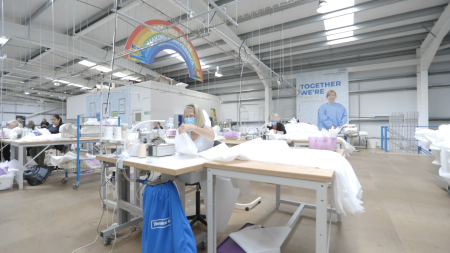Publish date: 12 October 2020
Innovation of health trust sees expansion of its PPE production facility

A North East health trust is leading the way and going one step further to boost the domestic supply of personal protective equipment (PPE) whilst providing a welcome uplift to the local economy.
Northumbria Healthcare NHS Foundation Trust has expanded its current production facility in its latest move to a new factory space (almost 40,000sq/m in size) based in Plant Based Valley, Seaton Delaval, Blyth Valley allowing the operation to grow and become even more ambitious.
The latest move will create 60 jobs for local people, as well as provide the opportunity for up to ten apprenticeships. Encouraging youngsters to explore a career in manufacturing, the hub will offer positions in sewing, cutting, warehouse and business administration and machine mechanics.
Sir James Mackey, chief executive of Northumbria Healthcare NHS Foundation Trust, said: “This is a monumental step for the trust and for, the Region. From the outset, we have worked collaboratively, and will continue to work closely, with partners to make sure that as many organisations as possible are given the opportunity to benefit from this innovative venture.
“Our overall production ambition is to produce as much high quality PPE locally, securing the supply chain, demonstrating that our patients and staff are always at the core of all we do. We are also very pleased to be able to create employment and learning opportunities for local people in our local communities. This is especially important in the current climate as we try and help the local economy get back on its feet. Now more than ever, health and social care providers need to be self-sufficient in procuring equipment – we are offering a solution that allows them to become non-reliant on international suppliers.
“Our hospital trust always strives to demonstrate leadership and this initiative shows that we are leading in patient and staff care and wellbeing, supporting our local economies and in partnership working. I feel extremely proud and thank everyone who is involved in this project, we are a great team.”
Hoping to secure a continued provision of PPE for health and social care providers, the factory will be producing isolation gowns, scrubs, theatre hoods, masks, theatre hats and pillows. Once production is fully up and running, it could bring cost savings to providers which can then be re-invested directly back into health care services.
Paul Dunn, director of finance at Northumbria Healthcare NHS Foundation Trust explained: “We are working as part of the national effort, with localities up and down the country coming together to open manufacturing hubs to equip their health and social care services. We are sharing our expertise and learning with others to help them open hubs too. With the latest expansion we have been able to boost local supply with the added benefit of supporting the textile industry at a time when unemployment is such a key issue and jobs are so hard to come by.”
It takes five to six minutes to make a gown and the material used, which was given technical approval by the Health and Safety Executive, is a laminated spun-bound nonwoven fabric and surgical scrubs take anything from ten – 16 minutes to produce. Products being supplied by all manufacturers in the network are mostly made in the UK – from the raw materials, the weaving of the fabric to the finishing of the gowns.
Sarah Rose, Managing Director of Lucas Jacob Consultancy and Director of Hobart Rose added: “This is such a fantastic opportunity to bring together local machinists, factory workers and seamstresses on a huge scale. Over recent months our doctors, nurses and clinicians have gone above and beyond to protect the public and this is our way of giving something back – by ensuring that they have access to the life saving PPE that they deserve. The fact that we are creating jobs and providing a cash injection for the local economy in the process is an added benefit for all. I would also like to take this opportunity to thank all of the volunteers who helped us set up the Cramlington site. It was the first, and very important, step of this ambitious journey and without it none of this would be possible.”
